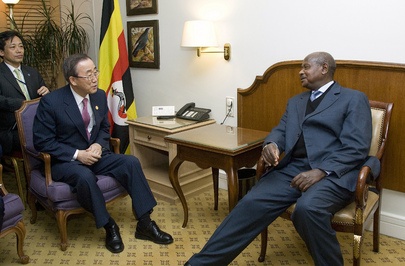
From demonization of gays to attacks on political opposition, Uganda has been sinking into authoritarianism and turmoil. The Lord’s Resistance Army has long enjoyed relative sanctuary moving across borders in the northwest regions. Efforts by the current President Yoweri Kaguta Museveni to retain office, now over 25 years after initially taking power in a coup, have brought crisis to democracy and the streets.
For Life President?
President Museveni was recently reelected, presumably in open elections. The priveleges and advantages of his long tenure as President of Uganda played undoubtedly a role regardless of whether the actual voting process was fair. In Uganda traditional “kings” continue to hold sway, and thus Mr. Museveni has defined his office and role more in such terms. However, this also has eroded the fundamentals of democratic and open society codes within Uganda. In recent weeks several people have been killed and perhaps hundreds injured.
The UN High Commissioner for Human Rights Navi Pillay issued a statement, (as reported by UN News Centre). She urged Ugandan authorities to immediately halt the use of “excessive” force against opposition politicians and protesters, The Commissioner described the use of force as disproportionate and said they were impinging on the key freedoms of ordinary Ugandans.
“Ms. Pillay drew attention to the case of Kizza Besigye, the opposition leader who has been arrested four times in the past three weeks, shot in the hand on one occasion and reportedly not fully recovered his sight after being hit by pepper spray at point-blank range on Thursday in Kampala, the capital. “The manner of Dr. Besigye's arrest on Thursday was shocking.
"The excessive use of force by security officers was plain to see in the television footage of the event. While I do not condone the violent rioting that followed, the Ugandan authorities must realize that their own actions have been the major factor in turning what were originally peaceful protests about escalating food and fuel prices into a national crisis.
"Uganda's police force and the People's Defence Force have indiscriminately used live bullets, rubber bullets, tear gas and pepper spray against demonstrators since the so-called 'Walk to Work' protests began on 11 April, and even sometimes against individuals not involved in the protests, according to information compiled by Ms. Pillay's office.
"Tear gas has also been fired into schools, health-care centres and homes, the Uganda Human Rights Commission reported.
“Many of these actions clearly constitute disproportionate and excessive use of force. Eight people have now lost their lives, including a two-year-old girl allegedly shot by a member of the security forces. The intervention of the security forces has resulted in infringements of the rights to life, liberty and security of the person, as well as of the freedoms of association, assembly and expression, In addition, the manner and motivation of the arrests and criminal charges against Dr. Besigye and other opposition leaders raise particular concerns,” the High Commissioner stated.
The High Commissioner welcomed the stated intention of the Ugandan Government to begin dialogue with opposition leaders and said it should address “the legitimate concerns and demands of the population” about rising costs of living and broadening the political space.
"Further protests are planned to take place on Monday, and Ms. Pillay urged authorities to “refrain from any further disproportionate use of force and to ensure respect for the people's rights to freedom of assembly and expression in accordance with Uganda's 1995 Constitution and its international obligations.
"She also called on the Government to conduct thorough, prompt and impartial investigations into the human rights violations carried out by the country's security forces."
---
In the context of international law, the investigation and justice rendered are as important as the actual abuses committed. This indicates a willingness to exercise command and control over security/military forces, an international legal obligation. It also reflects a commitment to the “rule of law” and to curtail abuses in the future. Undoubtedly now that a formal statement has been released, Uganda will remain on the agenda of the United Nations, at least the Office of the High Commissioner for Human Rights.
For Further Reports:
“Lord’s Liberation Army Rampage” -
diplomaticallyincorrect.org/films/movie/lords-liberation-army-rampage/24155
“Jane Bussmann (in Uganda) – Parts 1 & 2” -
diplomaticallyincorrect.org/films/movie/jane-bussmann-making-scene-at-un/26449
By Ambassador Muhamed Sacirbey
Face Book at “Diplomatically Incorrect”
Twitter - DiplomaticallyX

